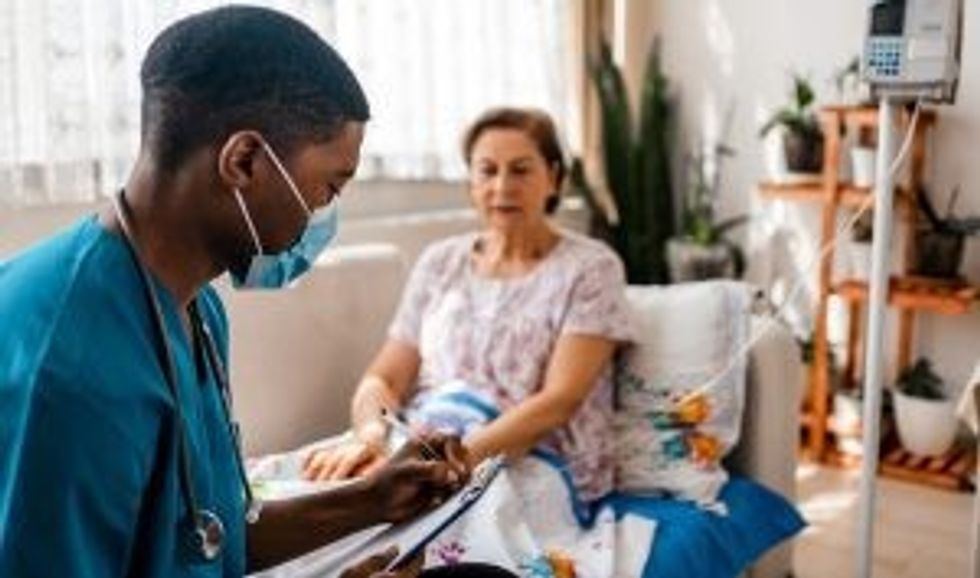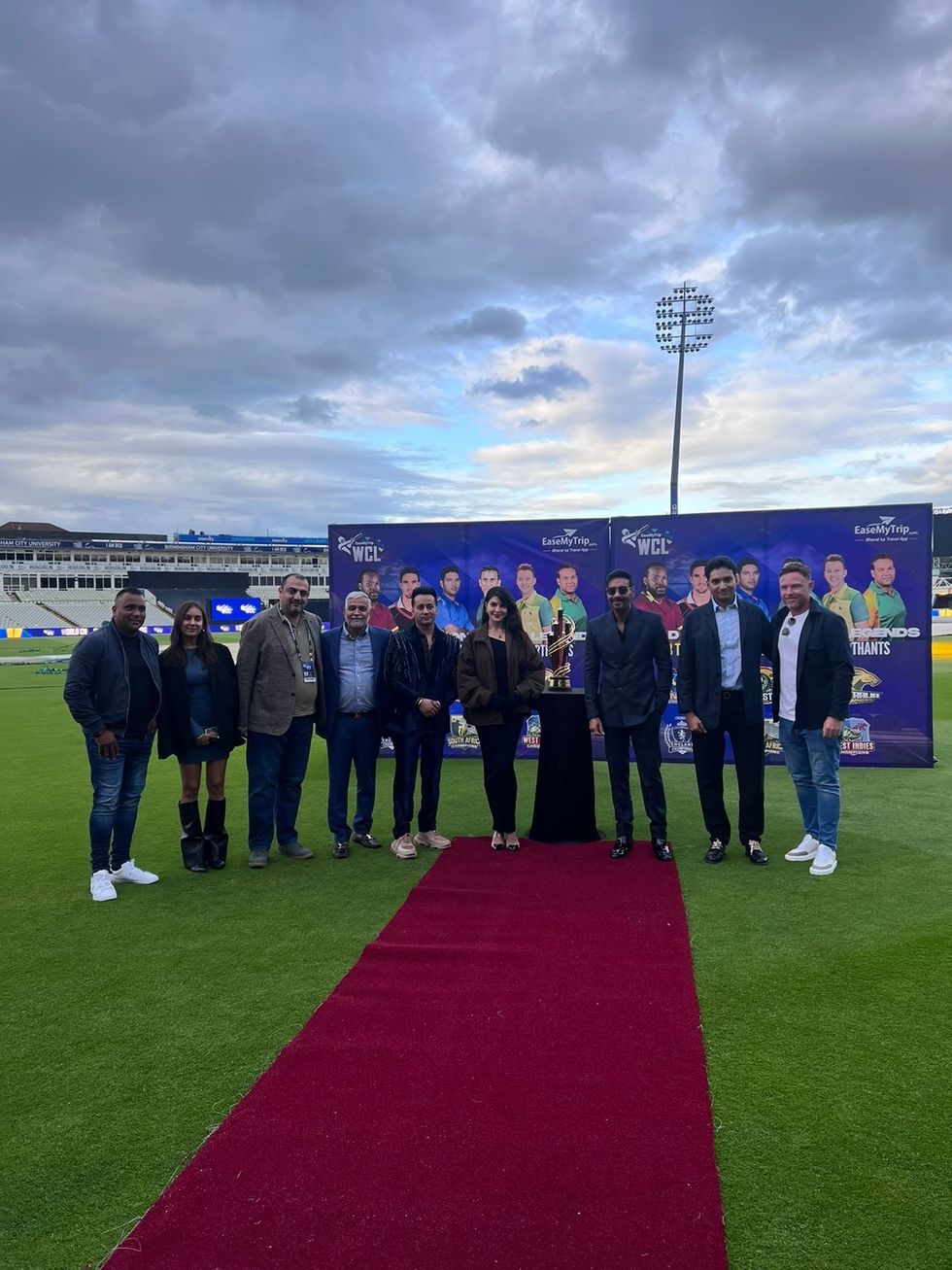Getting screened and tested early for cancer is a personal battle, Sajid Javid revealed.
Speaking to Eastern Eye, the health secretary, disclosed how his late father was diagnosed too late for the illness.
“My father died from cancer, but he died from, firstly, lung cancer, then it spread everywhere,” Javid said.
“And he wished that he had taken the early signs of it much more seriously.
“Unfortunately, for him, like so many people from ethnic minority communities are disproportionately detected too late.”
The health secretary’s plea to get more people screened is part of his department’s 10-year cancer plan.
He wants evidence which can show the disparity between different ethnic groups.
National data is not available, but academics who have carried out separate studies conclude that some cancers can affect south Asians more than other communities.
“When you look at breast cancer, lung cancer, colorectal cancer, if you're black or Asian, there's a much higher proportion of black and Asians who were detected at a late stage,” said the health secretary.
“Catch it at an early stage, there's a much greater chance that something can be done about it.
“But like my dad, when they detected his lung cancer, it was too late.
“For Asians, for example, for lung cancer diagnosis in the UK for Asians, 75 per cent is late stage, where for white people it's 66 per cent, and that's a massive difference.
“Just think, how many more lives you could save if people came earlier and got screened and got tested.”
Eastern Eye has previously highlighted how some women feel ashamed to go to their doctors.
By the time they present, nothing can be done to save them.
Meena, who did not wish to be identified, told this newspaper how her sister was ashamed to go to her GP.
“She had pains in her private area, and her periods weren’t regular, and she dismissed it.
“This happened for several months. She would confide in me that she was ashamed and didn’t want the doctors to poke around her private area in case they thought she was dirty and unclean.
“By the time the pain was unbearable, they found that she had cervical cancer, but it had spread to other parts of her body.
“It was too late, and she died. She was only 42.”
In March (2), Cancer Research UK published its study on how the disease affects different ethnic groups.
Researchers found that Asian people were more likely to get liver cancers than other groups.
Health information manager, Dr Rachel Orritt, told Eastern Eye that people had different reasons for not going to their GPs.
“Sometimes it's something as simple as practicality,” she said. “Do you have the time to go and talk to your doctor, or do the opening hours fit with when you've got the time to go?
“Are you able to get there in terms of transport, and those sorts of practical reasons.
“Other times, it's more of an emotional response.
“So, things like, fear, what if this could be something serious, or on the on the flip side of that, I don't want to waste my doctor's time, I don't want to go to them with something that's not a concern.
“But what's really important to remember is that it is the doctor's job to make the diagnosis, and to talk to you about your concerns and put your mind at rest or refer you on to further treatment.”
The charity said the earlier the disease is diagnosed the more likely the success of treating it.
“No one should feel shamed in any way of coming forward, whether it's to a doctor or a cancer screening clinic and getting tested,” Javid told this newspaper.
“This is all about making sure you get the care you need and live longer and healthier, not just for yourself, but for your family, as well.
“What we have found is that Muslim women are much less likely to come forward for breast screening than almost any other group, and that can't be right.
“They need to come forward for that screening, because breast cancer is one of those cancers that if you do detect it early, there's a very, very high success rate in treating it.
“But sadly, a disproportionate number of Muslim women will die from breast cancer because they're not coming for early screening.”
It is not just women. Balbir, not his real name, told Eastern Eye that he will not take up the NHS’ offer of screening for bowel cancer.
“They [the NHS] sent me three letters, and they kept on asking me to test for bowel cancer,” he explained.
“But they also wanted me to do the test, and that meant sending them a sample.
“I know I should do it, but why do I have to do all the work? Why can’t they send me for an appointment where they can poke, prod and scrape?
“Also, I don’t want to know whether I’m ill. I just want God to take me.”
The government’s consultation exercise for its 10-year plan ends on Friday (1 April).
The Cancer Research UK study also warned that because smoking and obesity were increasing among south Asians, these could lead to higher risks in cancers seen predominantly among white people.
“The concern is that if we don't make sure that there's equitable access to services, like stop smoking services, like weight management services, if we're not on top of that, those trends could reverse,” said Dr Rachel Orritt.
“So, what's really important here is that we keep pressure on the government to stick to its strong commitments around cancer prevention, to be really bold around cancer prevention.
“There's a huge amount of low hanging fruit, there's a huge amount of gains here, we can prevent a lot of cancer cases, if there is strong government action against the commitments that they've made.”
The health secretary is clear that he wants more of us to go and get tested and screened so specialists can catch the disease before it is too late.
“Anyone who's obese or smokes, for example, or addicted to alcohol, you're much higher risk of cancer,” warned the health secretary.
“Obviously, in terms of prevention, then that it's important that everyone tries to get the very best advice on eating more healthily, giving up smoking and drinking a lot less, because that helps.”
But Javid said that “because of certain behaviours in the Asian communities” they were at higher risks of cancer that in other groups.
One example was chewing raw tobacco on its own or when eating paan (betel leaves).
“Smokeless tobacco, I've seen people that use it, and it's a particularly south Asian thing.
“So, it won't be a surprise to you at all that the rates of rates of mouth cancer is the highest in this country among south Asian men.
“We all know why that happens, because they use smokeless tobacco, right, and it's causing a massive health problem for them.
“It can be prevented.”
Javid is urging so called community leaders to spread the message for early intervention.
“I would say to all community leaders, that they should make it clear whether it's through campaigns with the NHS or local GPs, that coming forward is vital.
“There are lots of screening available for cervical cancer, breast cancer and lung cancer.
“We've now got mobile trucks which do lung cancer checks in many areas, that they should come forward, because you will learn two things from the screening, either that you've got no cancer at all, which is fantastic.
“It improves your life confidence, that it's not an issue for you, or that you have cancer and it's detected early, and the NHS knows how to treat it.”
Cancer Research UK told this newspaper it supported what the government was trying to do.
And it wanted to make sure that racial disparities were eradicated.
“Whenever we think about cancer inequalities, in particular, it's important to know that they go across the cancer pathway,” said Dr Rachel Orritt from the charity.
“Right from the early stages, when we're talking about prevention, early diagnosis, but also in terms of treatment and survival.
“It's really important that we have government backing, and that they back their own commitments, and they put action behind those commitments as well, to act on those inequalities.
“There's a huge amount of work left to do. For years progressing, cancer has been too slow.
“We've had the disruption of the pandemic. We're now facing the prospect of that progress stalling.
“So as a country, we need to not be satisfied with that pace. And what we want to do at Cancer Research UK is make sure that we're, we're going faster, and we're going further with cancer research.
“It's critical for the people of this country.”
Warning signsAt the moment there is no single database which shows how many south Asians get the disease and what sort of cancers they get.
Data the government published last year suggests that when it came to lives lost owing to all cancers, the chances for south Asians were “significantly better” than for white people.
In other words, white people were more likely to perish from cancer.
But Cancer Research UK is concerned that factors such as obesity and drinking alcohol will narrow that gap in the coming years.
The government is urging everyone to go to their family doctors as soon as they get symptoms.
It is using public health messages on radio and social media to get the message to communities often ignored.
The NHS want people to contact their family doctor if they experience any of the below symptoms:
• tummy trouble, such as discomfort or diarrhoea for three weeks or more
• blood in urine - even just once
• unexpected or unexplained bleeding
• unexplained pain that lasts three weeks or more
• unexplained lumps
• cough which has lasted for three weeks or more (that is not COVID-19).
Other signs include:
• unexplained weight loss
• feeling tired and unwell and not sure why
• heartburn or indigestion
• unusual, pale or greasy faeces







 A compelling premise, layered and unpredictable charactersAMG
A compelling premise, layered and unpredictable charactersAMG Anyone who enjoys a gripping story with a diverse cast and unexpected twistsHarperFiction
Anyone who enjoys a gripping story with a diverse cast and unexpected twistsHarperFiction








 As WCL enters its second season, Sharma is scaling upwclegends.uk
As WCL enters its second season, Sharma is scaling upwclegends.uk


 Scarlett Johansson opens up about breaking free from early typecastingGetty Images
Scarlett Johansson opens up about breaking free from early typecastingGetty Images  Johansson reflects on her childhood stardom and evolving careerGetty Images
Johansson reflects on her childhood stardom and evolving careerGetty Images  From Avengers to auteur Scarlett Johansson embraces creative control Getty Images
From Avengers to auteur Scarlett Johansson embraces creative control Getty Images